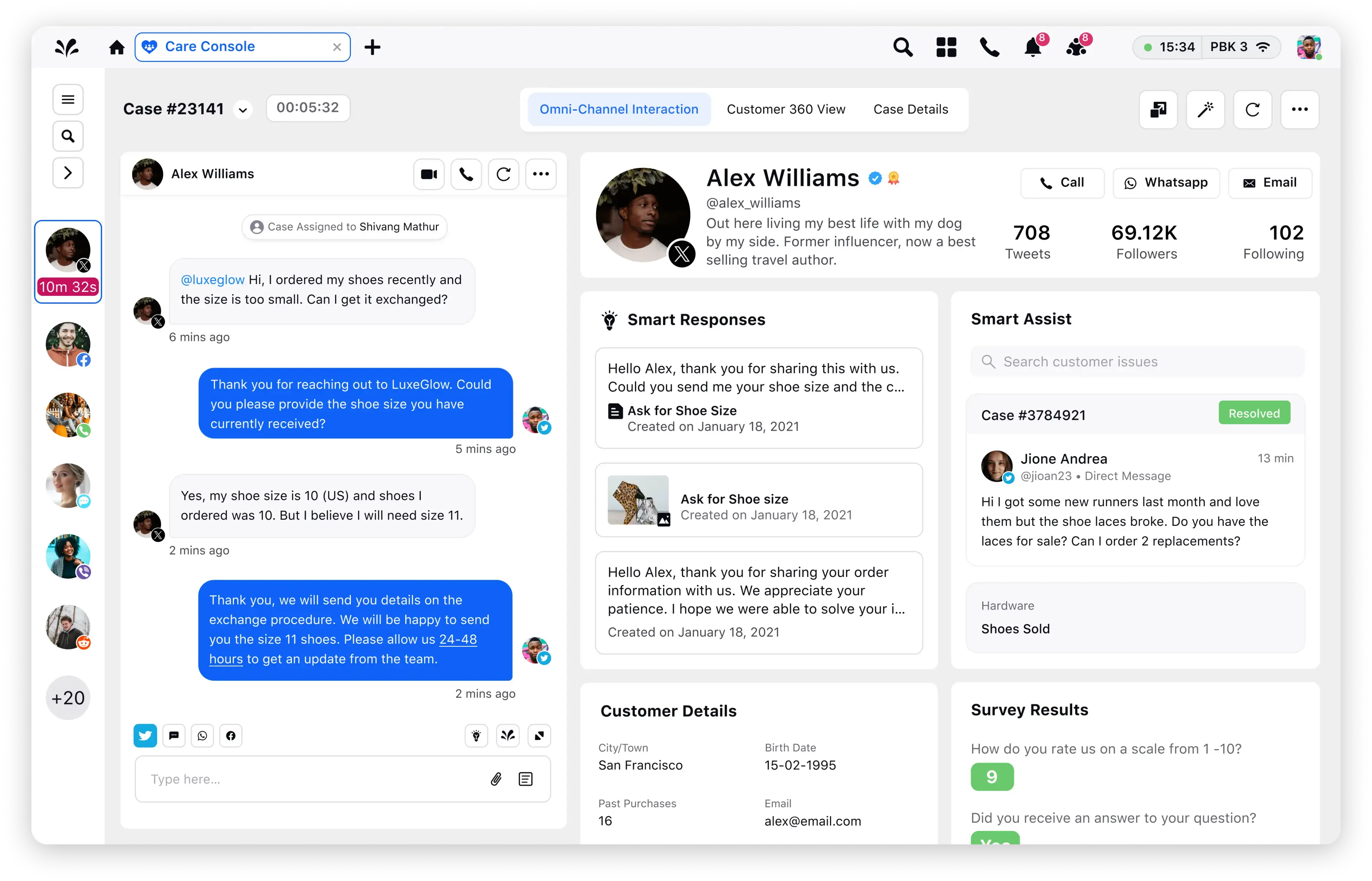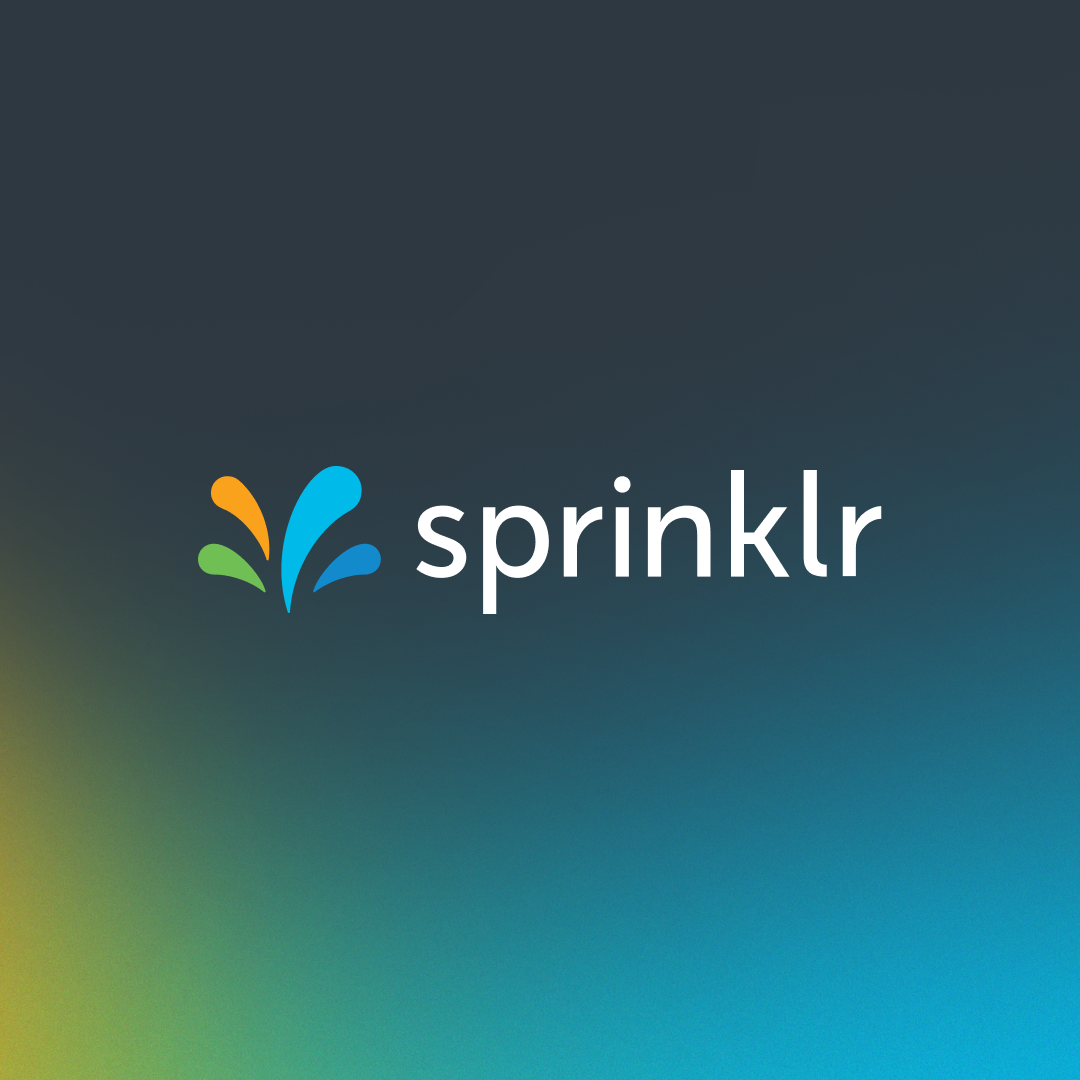The next generation of CCaaS is here
Digital-first customer service, enterprise-scale voice support. Redefine customer service with an AI-powered platform that unifies voice, digital and social channels. Power channel-less interactions and seamless resolution no matter the channel of contact.

Call Center Email Quality Monitoring - Dos and Dont's
As customer expectations continue to rise and your team works hard to create memorable interactions, it's crucial that your call center communication, whether written or verbal, aligns with your brand communication guidelines.
A single grammatical error in written communication can raise eyebrows, while a lack of empathy in language and tone can cause even greater harm. This is especially true for email communications, where agents must convey complex issues clearly and concisely without overwhelming the customer while maintaining the brand's voice and tone. Thus, the importance of call center email quality monitoring cannot be overstated.
This blog will cover everything you need to know about call center email quality monitoring — its significance, best practices, top improvement tips and examples.
What is email quality monitoring in a call center?
Call center email quality monitoring systematically evaluates email communications between call center agents and customers. This process ensures that emails adhere to the organization's standards for quality, consistency and customer service excellence. A few critical factors in call center email quality monitoring are:
- Response time: Timely responses are crucial in a call center setting. Monitoring ensures emails are answered within the expected timeframe to meet customer expectations and service level agreements (SLAs).
- Clarity and conciseness: Emails must be clear and concise, avoiding unnecessary jargon or overly complex language that could confuse the customer.
- Grammar and spelling: Correct grammar and spelling are essential to maintain professionalism and credibility.
- Tone and empathy: The email should reflect the brand's voice and demonstrate customer empathy, ensuring customers feel understood and valued.
- Adherence to brand guidelines: Every email should be consistent with the company's brand guidelines, including language, style and formatting.
Dedicated call center quality assurance teams are usually tasked with reviewing and evaluating email communications regularly. In some call centers, supervisors and managers also monitor and provide feedback to agents.
Why is call center email quality monitoring necessary
Tracking the quality of call center emails is essential for delivering exceptional customer experience. Here are some of the key benefits of call center email quality monitoring:
Enhanced customer satisfaction
According to customer experience (CX) statistics, about 80% of American customers state that what truly makes an experience exceptional is a blend of "speed, convenience, knowledgeable help and friendly service." Prompt, personalized responses make customers feel heard and valued. Call centers that consistently exhibit attention and care can develop trust, brand loyalty and customer satisfaction.
Focused brand building
Your business emails reflect your customer service mindset and are a chance to highlight your brand's image and values. Call center email quality monitoring helps you maximize this potential. Professional and informative emails build customer trust in your brand, reinforcing a positive brand image.
Compliance and risk mitigation
In 2022, the Information Commissioner's Office (ICO) fined Royal Mail Group £20,000 for unsolicited marketing. This incident underscores the importance of seeking permission before contacting your client base with marketing materials or using their data. Email quality monitoring is your ally in establishing protocols for agents and giving your organization the confidence to avoid violations and mitigate risks.
Operational efficiency
According to Statista, the global email user base is projected to reach 4.73 billion by 2026. By identifying focus areas and enforcing best practices, you can improve customer response times, achieve faster resolutions and reduce errors, thereby enhancing overall call center efficiency.
Insightful data analysis
Email quality monitoring provides valuable consumer insights for strategic decision-making and continuous improvement initiatives. Periodic analysis of email metrics, trends and customer feedback helps discern patterns, predict customer needs and optimize email marketing strategies.
8 Tips to improve call center email quality monitoring (+ Best Practices)
Done right, email quality monitoring can significantly impact the quality of your customer service. These eight tips will help you improve your monitoring of call center emails.
📝 Tip #1 Set clear guidelines
Clear guidelines are vital to the success of call center email quality monitoring. These guidelines should align with your customer service objectives and inform agents of the standards expected in email communications. Key areas to cover include response times, language, formatting, tone of voice and resolution protocols. When guidelines are precise, agents have a clear framework to follow, ensuring consistency and quality in email interactions.
💼 2. Offer comprehensive training
Well-trained agents can deliver accurate, comprehensive and empathetic email responses. Through in-depth call center agent training on email etiquette, product knowledge and problem-solving techniques, your call center agents can confidently address customer queries ranging from random inquiries to complex troubleshooting. Here is how to go about call center training and coaching:
- Structured onboarding: Onboarding programs are a crucial investment in your new agents. These comprehensive programs familiarize them with company policies, procedures and brand guidelines. Consider creating a repository of past email interactions that exemplify swift and effective resolutions, serving as practical examples for new agents. This will ensure they start off on the right foot, ready to provide excellent customer service.
- Role-playing exercises: Incorporate role-playing exercises and team meetings to simulate genuine customer email interactions. These exercises provide agents with hands-on experience in a controlled environment, helping them develop confidence and proficiency in handling various customer service scenarios.
❗3. Identify what often gets missed out
In the rush of email communication, it's all too easy to overlook certain details that can make a big difference in how your message is received. From forgetting attachments to spotting typos just after hitting send, these common mishaps can undermine the professionalism and effectiveness of your emails. That's why it's essential to identify the areas that often get missed out and give them the attention they deserve.
For instance, consider the clarity and brevity of your subject lines, especially for mobile viewing. Setting appropriate priority levels, such as 'Important' or 'Critical', ensures urgent emails stand out in crowded inboxes.
Additionally, meticulously checking grammar, punctuation and the use of emojis can elevate the overall tone and impact of your message. By focusing on these overlooked details, you can ensure your emails are polished, professional and impactful.
✅ Tried and tested
Standardized email signatures play a pivotal role in maintaining a professional and cohesive brand image across all customer interactions. By ensuring that all your agents use standardized email signatures with essential information such as their full name, job title and the company logo, you make them feel integral to the company's operations.
Keep signatures clean and uncluttered to maximize effectiveness. Avoid excessive images or unnecessary personal quotes. Additionally, periodically review and update email signatures to reflect any changes in contact information or branding guidelines.
📧 4. Use email templates wisely
Email templates are essential tools for ensuring consistency and efficiency in call center communications. They help streamline responses and maintain a uniform tone across all customer interactions. However, it’s equally important to balance efficiency with personalization to preserve a human touch in customer service.
⏳5. Monitor response times
Monitoring response times is crucial for resolving customer issues in time and meeting call center service level. In a call center environment, prompt responses are expected and critical to maintaining customer satisfaction and trust. Here's how to do it.
- Track and analyze response times: As managers, your continuous tracking of response times is key to identifying bottlenecks and areas needing improvement. By fixing gaps in the customer service workflow, you can empower your team to allocate resources more effectively, prioritizing inquiries based on urgency and complexity.
- Automate SLA management: Implement automated systems to manage SLA policies for email tickets. This automation can help you monitor adherence to response time commitments and ensure that deadlines are consistently met.
- Activate breach alerts: Another way to boost response times is to configure breach alerts to notify agents and managers when response times are approaching SLA thresholds. Set these alerts based on predefined criteria, such as the time remaining until the SLA deadline and the severity of the breach.
🚀Translating faster response times into lightning-fast resolutions
Sprinklr AI revolutionizes email management by analyzing content at scale to identify messages requiring replies. It then categorizes and routes them to the appropriate teams for efficient handling.
Moreover, Sprinklr AI+ empowers agents to resolve customer issues quickly with smart responses. It suggests responses, recommends similar cases, provides relevant knowledge base articles and offers guided workflows. The result? A remarkable 50% reduction in query resolution time!
Learn more about Sprinklr agent assist software.


🔍6. Develop a robust review process
Creating a comprehensive review process that includes regular audits and random sampling of emails is one of the most effective ways to catch any deviations from established standards. Involving QA teams, supervisors and managers in the call center email quality monitoring process ensures diverse perspectives on quality and consistency.
💰 Two cents from Sprinklr
Call center email IDs can potentially be misused for unauthorized activities such as harassment or inappropriate downloads. During onboarding, communicate strict guidelines about acceptable email use and the consequences of violating these policies.
Transparency and consent: From the beginning, make it clear to agents that their emails are monitored. Clearly state the purpose of monitoring and ensure that agents understand the importance of compliance.
Restricted access: Limit email access to authorized personnel only. Provide clear instructions about the confidentiality of company emails and the necessity of not sharing them with external parties without legal approval.
✅ 7. Utilize quality assurance software
While random sampling of emails for review can be beneficial, it may not be the most innovative or accurate approach as it leaves room for error. Leveraging call center technology, you can vastly improve the accuracy and efficiency of your email quality monitoring process. It automates the tracking of response times, analyzes email content for tone, compliance and accuracy and provides detailed insights into call center KPIs, highlighting improvement areas.
Good to Know: Modern AI-powered quality management software samples cases based on your desired AI-driven rules. Its advanced feature allows you to identify even the most elusive red flags and prioritize critical cases efficiently. Additionally, its message filtering, escalation and customer response compliance features ensure that every reply your team sends is relevant, professional and on-brand.
📋 8. Incorporate customer feedback
Collecting and analyzing customer feedback helps you understand customer perceptions and pinpoint improvement areas.
Implement methods such as post-interaction customer surveys, feedback forms and follow-up emails and encourage customers to share their thoughts on the clarity, helpfulness and tone of the email responses they receive.
Systematically analyze the collected feedback to identify recurring themes and areas where your email communications may fall short. Use this data to refine your quality standards and update your call center coaching programs, ensuring that agents are well-equipped to meet customer expectations.
📌Pin it until you fix it
Assess your teams' SLA adherence by team, region, product, language and timeframe to grade their performance. Keep a checklist to ensure comprehensive monitoring:
- Consistency: How consistently does your team meet SLAs for email response time and resolution time?
- Timeframes: Are there certain timeframes (e.g., morning, afternoon, evening) where SLA adherence for email performance tends to be more challenging?
- Product/service variability: Does SLA adherence vary across different products or services your call center offers in email interactions? If so, investigate the reasons behind this variability.
- Benchmark comparison: How do SLA adherence levels for email performance compare to industry benchmarks or standards?

Tools for email quality monitoring in call centers
Many options in the market can help call centers monitor the quality of email correspondence. These tools equip you to refine your processes, advance agent performance and improve customer satisfaction. Here are three popular tools.
1. Sprinklr
Sprinklr built on the world’s only Unified-Customer Experience Management (Unified-CXM) platform, stands out as the premier call center email quality monitoring tool for several reasons:
- AI-powered insights: Sprinklr uses advanced AI to identify gaps in call center processes and performance, providing actionable insights that help improve CSAT and operational efficiency.
- Omnichannel integration: The platform ensures seamless, consistent experiences across all customer service channels. Agents can switch between channels while retaining full conversational context, enhancing the customer journey and loyalty.
- Real-time monitoring and alerts: AI-powered reporting and analytics notify your supervisors of escalations, missed SLAs, low CSAT predictions and agent performance issues in real-time, allowing for proactive management and quick resolutions.
- Comprehensive agent insights: Supervisors have complete visibility into quality scores and key performance insights for each agent, enabling targeted training and performance improvements.
- Sentiment analysis: AI-powered sentiment analysis helps agents understand customer emotions during interactions, leading to more empathetic and effective responses.
- SLAs and performance metrics: Sprinklr allows for detailed monitoring of SLA adherence across various dimensions (team, region, product, language, timeframe), providing a clear understanding of where improvements are needed.
- Automated quality assurance: The tool automates quality and call center agent performance metrics insights, providing a complete view of team performance and ensuring consistent and accurate call center reporting.
2. Zendesk
Zendesk offers a comprehensive customer service platform with email management features tailored for call center use. Its user-friendly interface and analytics allow call centers to efficiently manage email inquiries and monitor agent performance.
- Ticketing system: Zendesk's ticketing system groups email inquiries into tickets so agents can monitor, schedule and manage customer issues smoothly.
- Automation: The tool's automated workflows streamline everyday tasks like routing emails, categorizing inquiries and delivering standard responses. This increases efficiency and reduces agent workload.
3. Freshdesk
Freshdesk has email management features that simplify email workflows and increase agent productivity. Its easy-to-use interface and automation capabilities make it a great choice for call centers of all sizes.
- Ticketing system: The Freshdesk ticketing system converts emails into tickets, enabling agents to track, prioritize and resolve customer issues methodically.
- Automation: With Freshdesk, call centers can automate routine tasks, such as assigning tickets, sending follow-up emails and escalating urgent inquiries. This reduces manual effort and improves response times.
- Collaboration tools: Freshdesk offers collaboration tools such as internal notes and shared views, which support communication and teamwork among agents and help them answer customer queries promptly.
Effortlessly monitor call center emails with Sprinklr
You know the drill: keeping those email interactions top-notch in your call center is key in today's world. Because the stakes are high — a single overlooked email or delayed response can lead to dissatisfied customers, damaged reputations and lost business. You've likely faced the pain of inconsistent service quality, missed SLAs and the constant struggle to keep up with customer expectations.
But it doesn't have to be this way. Sprinklr's AI-powered quality management software not only automates and enhances your email quality monitoring but also empowers your team to provide faster, more accurate and more empathetic responses. With features like real-time performance monitoring, automated insights and seamless CRM integration, it transforms how you manage customer interactions.
But hey, don't just take our word for it. Dive in and see for yourself with a free trial of Sprinklr. Ready to hit that button yet 👇— Let's make managing your call center emails a breeze.
Frequently Asked Questions
Quality monitoring in a call center involves supervisors listening to calls and assessing agents' performance based on predefined criteria. Quality assurance, on the other hand, refers to the systems put in place to ensure customer interactions meet specified standards.
To maintain email quality assurance, establish clear guidelines for email responses, provide agents with comprehensive training, regularly review email interactions and offer constructive feedback for improvement.
Choose a quality monitoring tool when you need to systematically evaluate email interactions, track performance metrics, identify trends or areas for improvement and ensure consistency in email responses.



